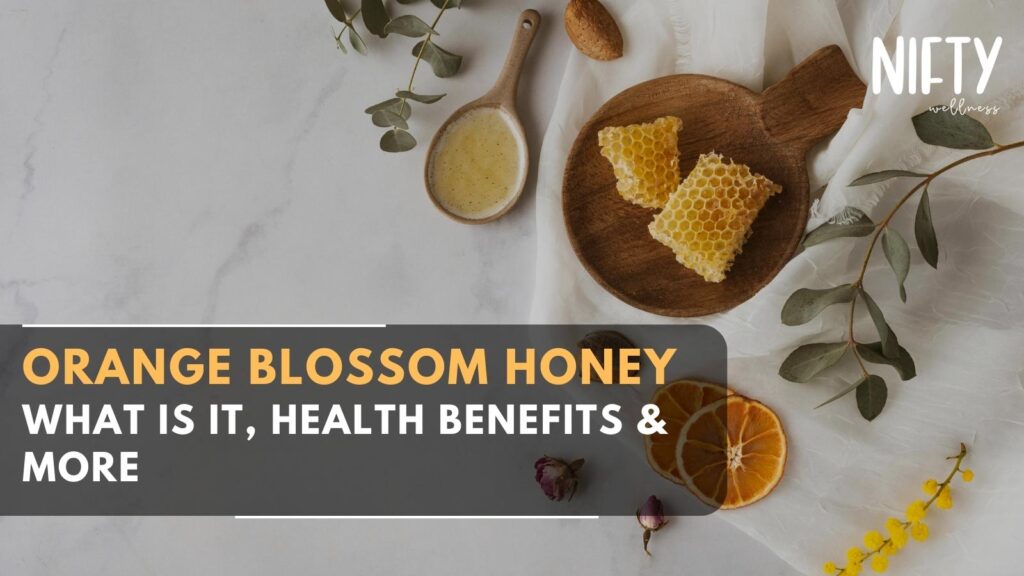Orange blossom honey is a golden elixir that captivates the senses with its alluring fragrance and delectable taste. But it’s more than just a delicious natural sweetener. This liquid gold is a testament to the beauty of nature and the intricate dance between bees and orange blossoms. In this blog, we’ll embark on a sweet journey to unravel the secrets of orange blossom honey – what it is, the “orange blossom honey benefits,” and the delightful ways it can be incorporated into your life. So, let’s explore the world of orange blossom honey and discover the nectar of the citrus groves.
What Is Orange Blossom Honey?
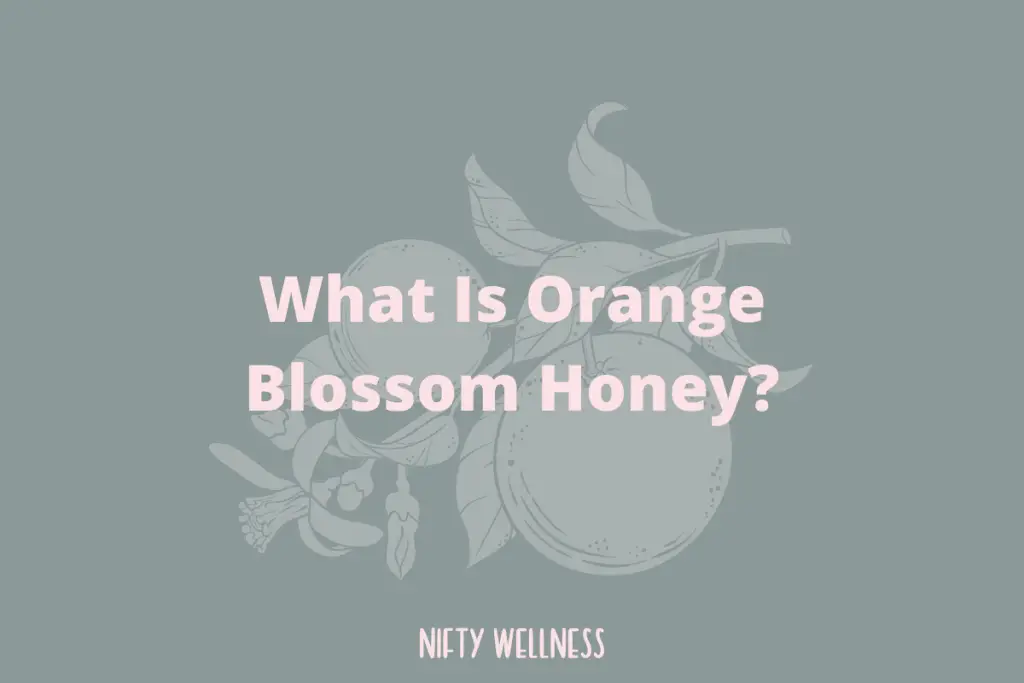
Orange blossom honey is a variety of monofloral honey produced from the nectar and pollen of flowering orange trees.
Orange blossom honey is most often produced in blooming orchards with a dense population of orange trees that can provide enough nectar and pollen to support a generous yield.
Though orange blossom honey is commonly described as a monofloral honey, it is extremely common for bees to mix-in the nectars of other local, in bloom citrus species such as grapefruit, lemon, mandarin, tangerine, and lime.
Citrus blossoms are a favorite nectar and pollen source for bees that they store and use to live off during the colder winter months.
(Read more about the unique avocado honey – in a new tab.)
So, What Constitutes Orange Blossom Honey?
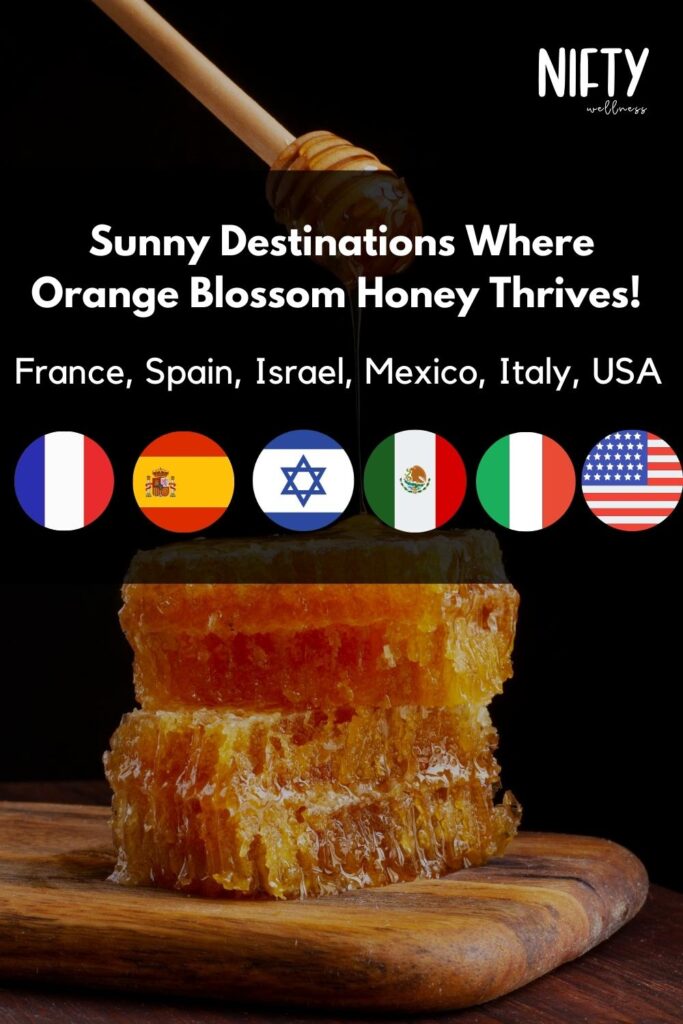
To be considered a variety of orange blossom honey, a pollen count of orange citrus must be twenty-percent or higher. This is partly due to the concentration of other citrus fruits and plants in range to the bees during pollination.
Sometimes, if the concentrations of other citrus fruits are too high, the honey may be labeled as citrus honey. This is common in Italy, where bees regularly gather the nectar of clementines, bergamot, or a mixture of lemon, mandarin, bergamot, and citron.
To ensure that the bees gather nectar mostly from orange blossoms and not from other neighboring plants and flowers, beekeepers will go through great lengths to keep their yield monofloral.
Most often, beekeepers will set up their apiaries in areas that are densely populated with orange blossoms. Farmers and beekeepers may also assist with the pollination process by relocating honey bees to an orange grove that is in bloom.
Orange blossom honey is produced in warmer climates such as France, Spain, Israel, Mexico, and Italy. However, it is also popular in the United States and is predominantly produced in Florida, Texas, and California.
Check out our blog Chesa Fruits: Nutrition & Benefits Of The Infamous Eggfruit. Elevate your vitality and embrace a chesa-fueled wellness journey!
Orange Blossom Honey Health Benefits
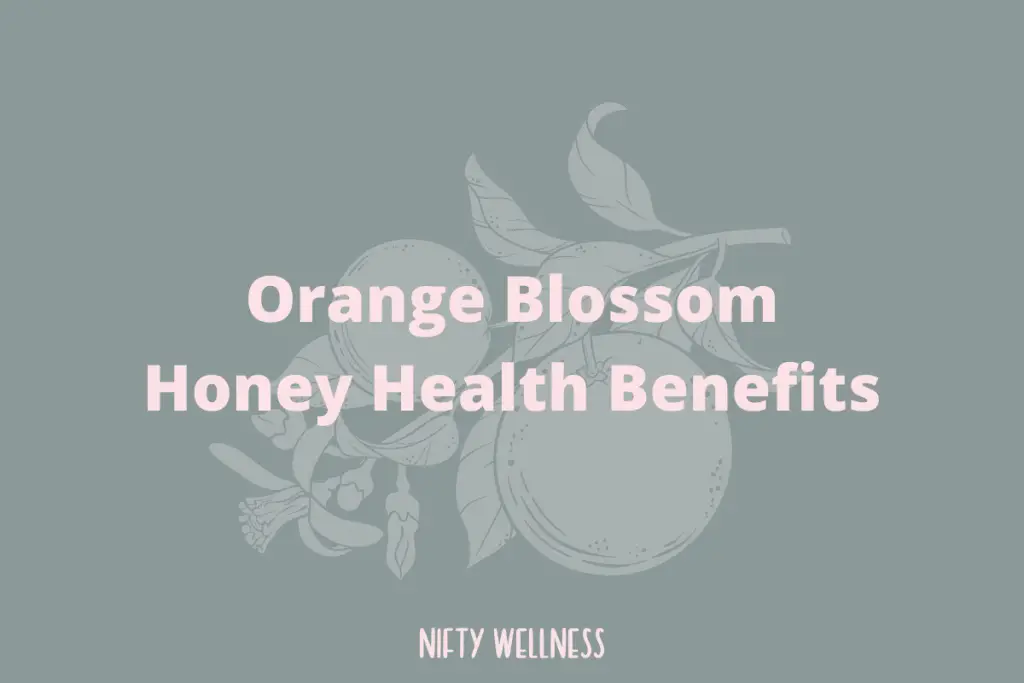
Rich Source Of Antioxidants
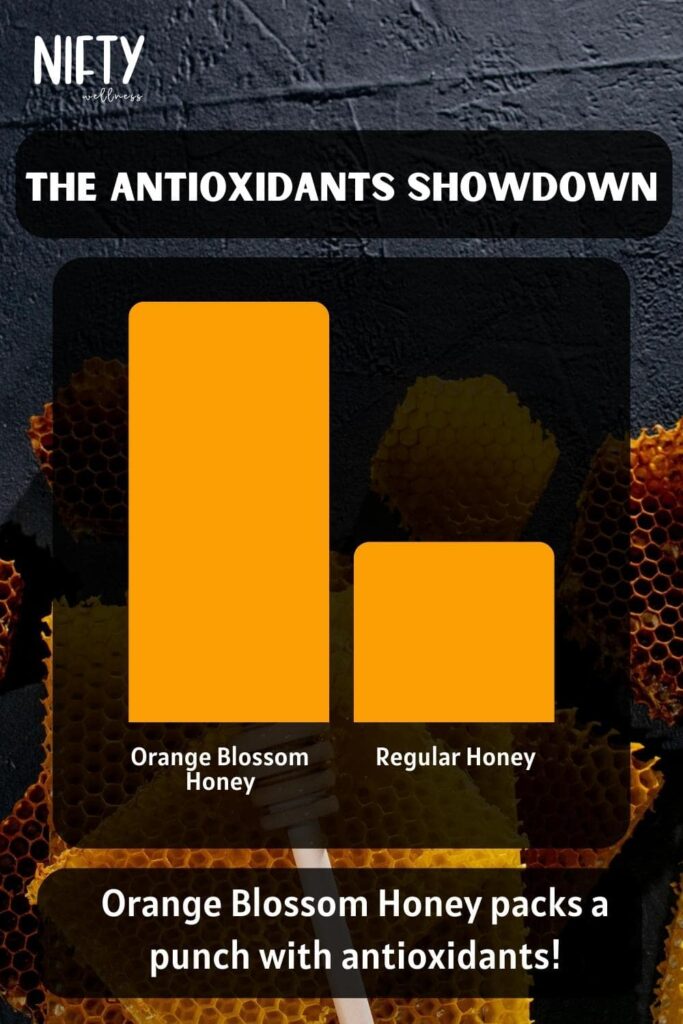
Orange blossom honey is a rich source of antioxidants that includes several flavonoids such as quercetin, hesperetin, luteolin, galangin, naringenin, isorhamnetin, and kaempferol.
Studies show that consuming a diet rich in flavonoids can reduce one’s risk of developing metabolic disorders, cardiovascular diseases, and certain types of cancer.
Antimicrobial
Like other types of honey, orange blossom honey contains antimicrobial properties that can heal wounds, treat infections, and prevent bacterial growth.
Orange blossom honey’s antimicrobial nature is also beneficial for treating upper respiratory tract infections. In addition to reducing the number of bacteria, its viscous consistency calms and protects the throat lining.
Soothes Inflammation & Irritation
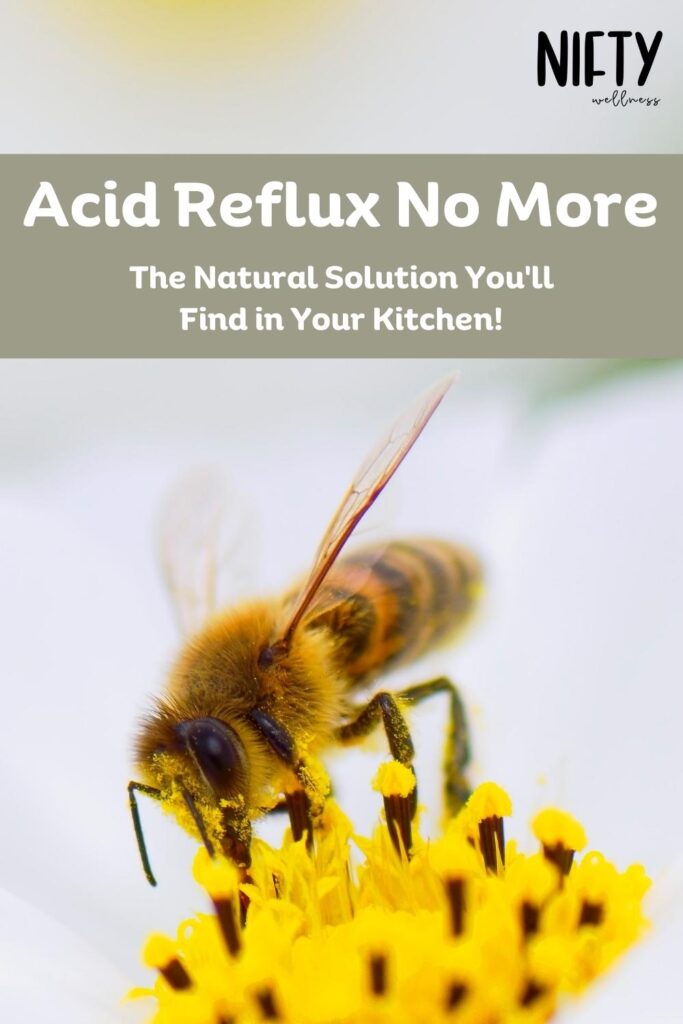
Orange blossom honey contains an antioxidant compound known as quercetin. In scientific studies, this flavonoid has been shown to improve mental and physical health due to its anti-inflammatory and immune-boosting properties.
Orange blossom honey is also known to support intestinal health by calming inflammation and irritation.
This soothing property may even help reduce and prevent acid reflux by coating the linings of the esophagus and stomach and preventing indigestion and the upward flow of undigested food and stomach acid.
Nutrient Dense
Raw orange blossom honey is full of vitamins, minerals, and other phytonutrients that benefit one’s health.
Orange blossom honey contains a mineral content composed of essential nutrients like boron, manganese, calcium, selenium, copper, zinc, potassium, and sodium.
Though the amounts of each nutrient will vary slightly depending on the location where the honey was gathered and other specifics relating to a batch of honey.
Caffeine Content

One of the most exciting qualities of orange blossom honey is its caffeine content, which is not found in any other variety of honey.
However, the caffeine content is less than four milligrams per kilogram of honey, a ratio that is considerably less than a cup of decaf coffee.
Read our blog Myomin Benefits & Side Effects: Is It Powerful. Discover a natural approach to better health with Myomin and its unique properties.
Orange Blossom Honey vs Clover Honey
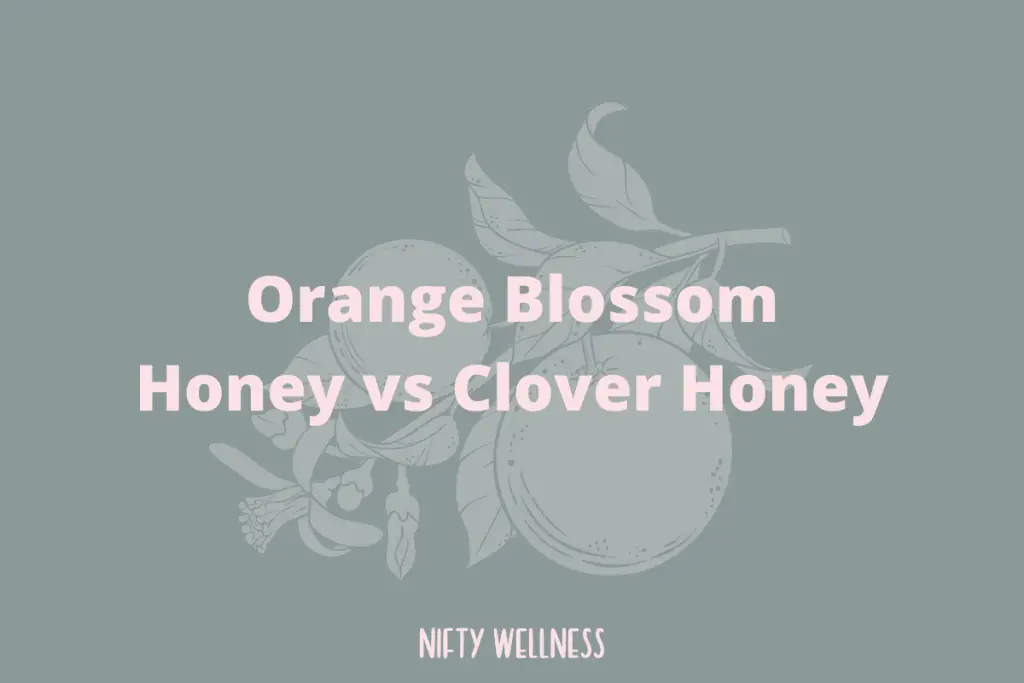
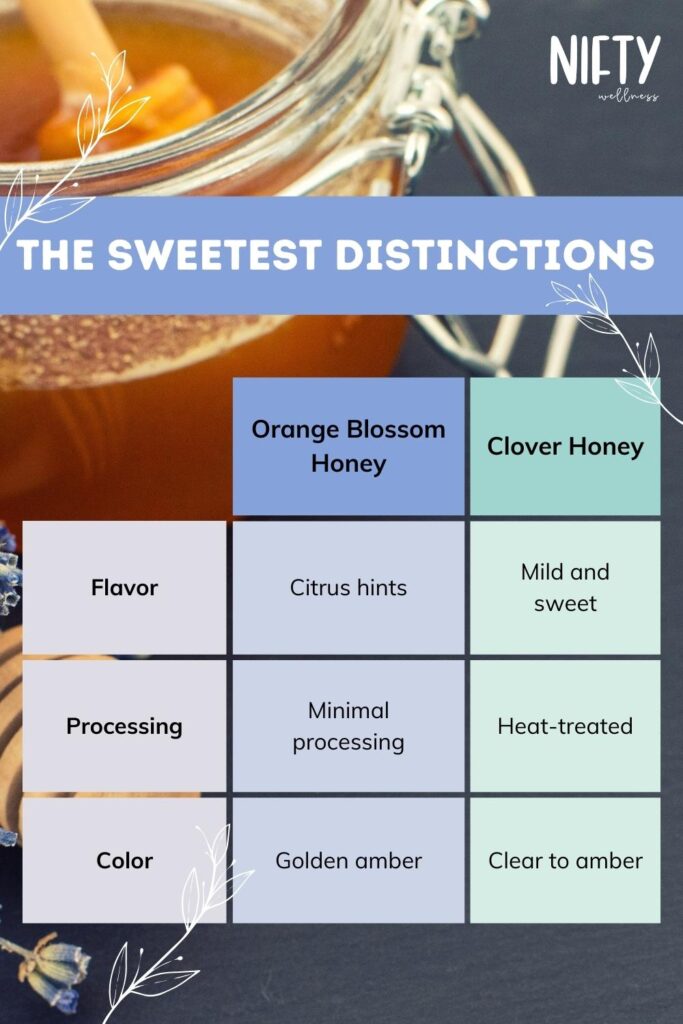
Clover honey is the most common variety of honey and is likely the honey you see most often during your visits to the grocery store.
Clover honey comes from the nectar of several clover varieties: Dutch, sweet, white blossom, and yellow blossom clovers. Most of the time, clover honey is a blend of several different clover varieties. It is common to see clover honey as a processed honey.
Orange blossom honey is typically a raw honey that comes from the nectar of citrus plants, most commonly orange. This liquid gold is meticulously harvested from the fragrant nectar of citrus blossoms, primarily orange trees. The result is a honey that captures the essence of sunny groves, offering a floral and citrusy sweetness as vibrant as the orchards.
Orange blossom and clover are similar in color as both are typically light in color, varying from clear water white to light golden amber. Both are mild and sweet in flavor, though orange blossom does boast a hint of citrus.
Orange blossom and clover honey are widely accessible and can be used in many different recipes to sweeten both food and drink.
Orange Blossom Honey vs Regular Honey
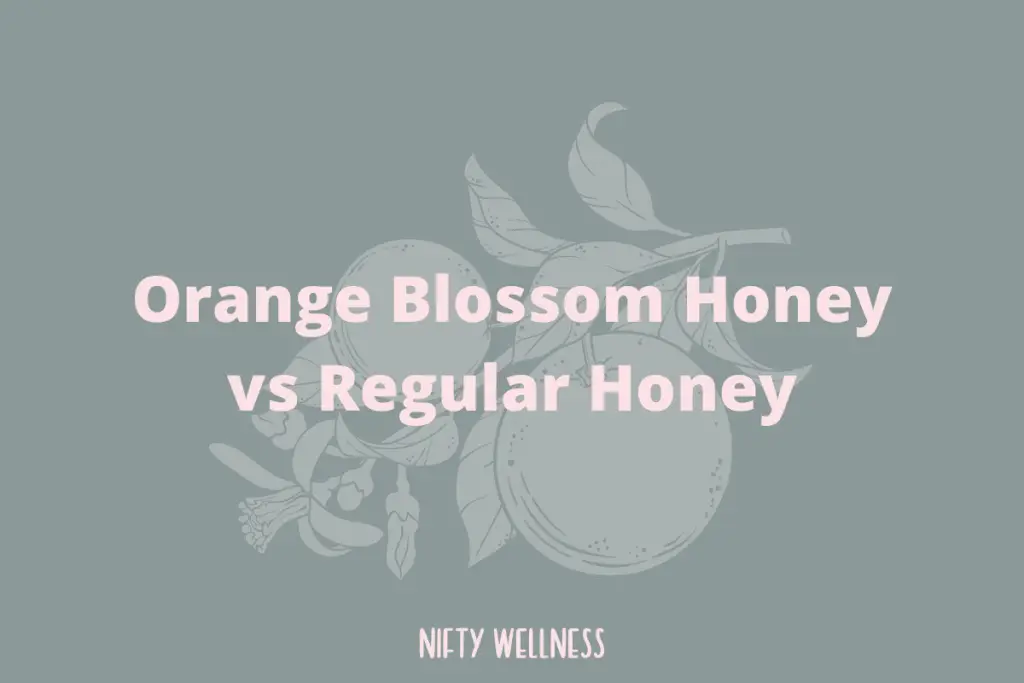
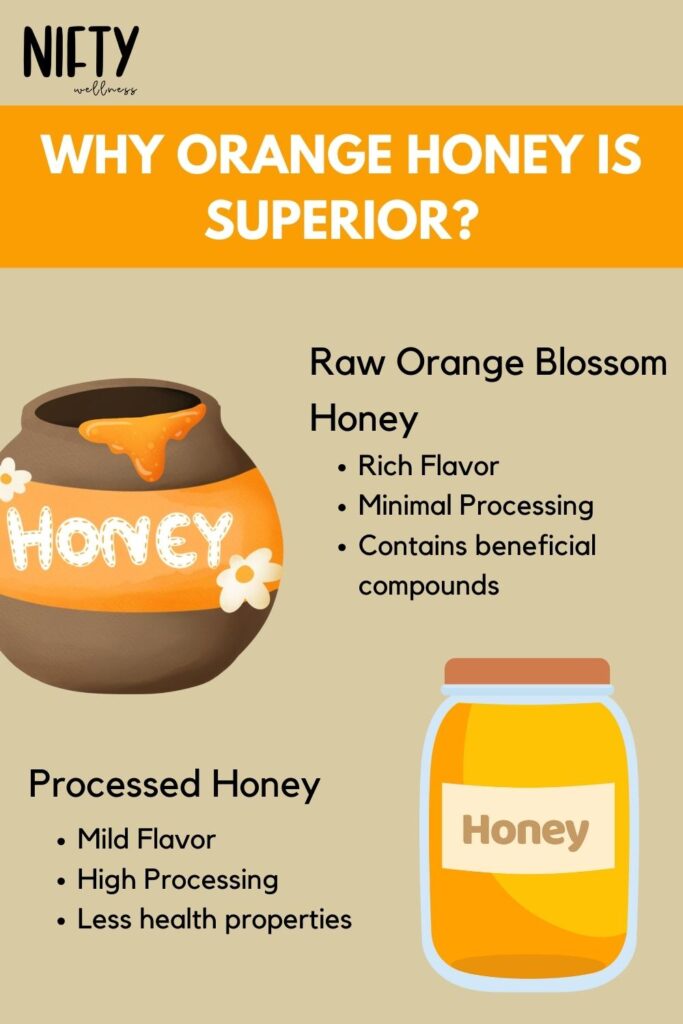
What is often referred to as “regular” honey is traditionally processed, pasteurized honey that has been heated to high temperatures that remove most of the honey’s intrinsic health properties.
In contrast, orange blossom honey retains all these valuable components, especially in its raw form. This makes it a healthier and more nutritious choice, offering both sweetness and a range of potential health benefits.
Unlike processed honey (which contains significantly less propolis, bee pollen, antioxidants, and more), raw orange blossom honey will retain all of the beneficial compounds that make it an effective natural treatment and superfood.
Conclusion
In conclusion, orange blossom honey is a remarkable gift from nature for its deliciously sweet flavour and numerous health benefits. Rich in antioxidants, antimicrobial properties, and soothing effects, this honey variety is a versatile and nutritious addition to your diet. It’s a testament to the incredible diversity of honey and how its source can influence its properties. Whether you choose it for its health advantages or the unique hint of citrus, orange blossom honey is a true gem among nature’s sweet offerings. So, savour its flavour and nourish your health with this delightful gift from the orange groves.
Frequently Asked Questions

What Does Orange Blossom Honey Taste Like?
Orange blossom honey has a mild, delicate, sweet flavor with subtle hints of citrus fruit. Its sweetness lends it to be a great baking honey that can be used in citrus-infused muffins, cookies, or breads.
Orange blossom honey is also delicious to sweeten teas and coffee or drizzled on top of oatmeal, pancakes, and yogurt.
What Does Orange Blossom Honey Look Like?
The color of orange blossom honey can vary from pale, light gold to darker amber. Some bee experts believe that the purer the orange blossom honey is, the lighter its color should be. Orange blossom honey is also rich and has a viscous consistency.
How Is Orange Blossom Honey Produced?
Once the honeybees gather the nectar from the flowering orange blossoms, the nectars combine with an enzyme in the bees’ mouth known as invertase.
From there, they will deposit the nectar at the hive, where the bees will adjust the nectar’s water content and convert it into honey. Orange blossom honey typically has a water content that’s below twenty percent.
What Is Orange Blossom Honey Used For?
Orange blossom honey makes a fantastic dietary supplement due to its high levels of antioxidants and beneficial nutrients.
Can You Eat Too Much Orange Blossom Honey?
Like other types of sugar, eating too much orange blossom (though it is natural) can disrupt the gastrointestinal system causing pain, bloating, constipation, and discomfort.
Overeating sugar will also spike your blood sugar levels and could lead to unhealthy weight gain.
Is Orange Blossom Honey Expensive?
Orange blossom is one of the most affordable types of raw honey and one of the most accessible. Purity standards do influence the price of orange blossom honey.
Does Orange Blossom Honey Crystalize?
Orange blossom honey tends to crystalize more quickly than other honey types due to its high glucose content. If your orange blossom honey crystallizes, place the sealed jar in a bath of warm water to break down the crystals and restore them to their liquid state.
